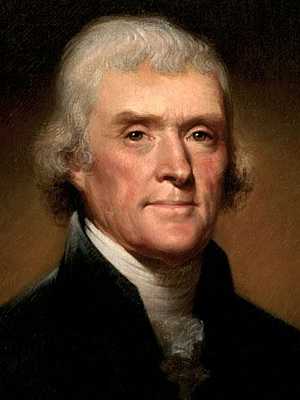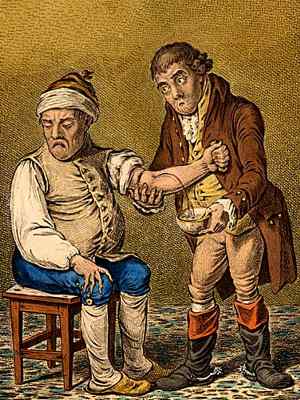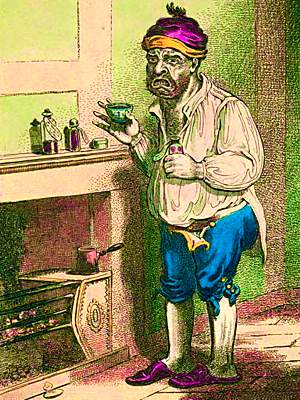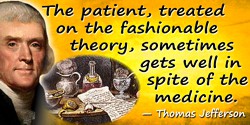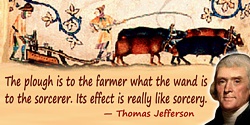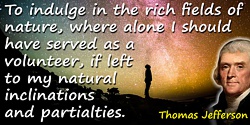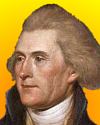 (source)
(source)
|
Thomas Jefferson
(13 Apr 1743 - 4 Jul 1826)
American statesman, astronomer, scholar and inventor who wrote the Declaration of Independence (1776) and organized the Lewis and Clark expedition (1803). His only full-length book, Notes on the State of Virginia contains an outline of the geography, flora and fauna of Virginia, and established his reputation as a scholar and a pioneering American scientist.
|
Thomas Jefferson on Quack Medicine
from Letter to Dr. Caspar Wistar (1807)
[Introductory note by Webmaster — While Thomas Jefferson was President, he corresponded with Professor Caspar Wistar in Philadelphia about getting his 15-yr-old grandson a good science-based education at the fine institutions in that city. Wistar was one of the early Republic’s great anatomists and first paleontologists. While writing about his wishes for his grandson to to “attend the schools of Botany, Natural History, Anatomy, & perhaps Surgery;” Jefferson added “but not of Medicine. And why not of Medicine, you will ask?” Thus Jefferson introduced his skepticism about the quality of medical knowledge among general practitioners of the time. He wrote at length in the letter about his opinions on the matter. Omitting the references to personal matters (indicated by the ellipses), here is what Jefferson explained to Wistar.]… And why not of Medicine, you will ask? Being led to the subject, I will avail myself of the occasion to express my opinions on that science, and the extent of my medical creed. …
… and further tax your patience with unlearned views of medicine; which, as in most cases, are, perhaps, the more confident in proportion as they are less enlightened.
We know, from what we see & feel, that the animal body in it’s organs and functions is subject to derangement, inducing pain, & tending to it’s destruction. In this disordered state, we observe nature providing for the re-establishment of order, by exciting some salutary evacuation of the morbific matter, or by some other operation which escapes our imperfect senses and researches. She brings on a crisis, by stools, vomiting, sweat, urine, expectoration, bleeding, &c., which, for the most part, ends in the restoration of healthy action.¶
Experience has taught us, also, that there are certain substances, by which, applied to the living body, internally or externally, we can at will produce these same evacuations, and thus do, in a short time, what nature would do but slowly, and do effectually, what perhaps she would not have strength to accomplish. Where, then, we have seen a disease, characterized by specific signs or phenomena, and relieved by a certain natural evacuation or process, whenever that disease recurs under the same appearances, we may reasonably count on producing a solution of it, by the use of such substances as we have found produce the same evacuation or movement. Thus, fulness of the stomach we can relieve by emetics; diseases of the bowels, by purgatives; inflammatory cases, by bleeding; intermittents, by the Peruvian bark; syphilis, by mercury: watchfulness, by opium; &c.¶
So far, I bow to the utility of medicine. It goes to the well-defined forms of disease, & happily, to those the most frequent. But the disorders of the animal body, & the symptoms indicating them, are as various as the elements of which the body is composed. The combinations, too, of these symptoms are so infinitely diversified, that many associations of them appear too rarely to establish a definite disease; and to an unknown disease, there cannot be a known remedy. Here then, the judicious, the moral, the humane physician should stop.¶
Having been so often a witness to the salutary efforts which nature makes to re-establish the disordered functions, he should rather trust to their action, than hazard the interruption of that, and a greater derangement of the system, by conjectural experiments on a machine so complicated & so unknown as the human body, & a subject so sacred as human life. Or, if the appearance of doing something be necessary to keep alive the hope & spirits of the patient, it should be of the most innocent character.¶
One of the most successful physicians I have ever known, has assured me, that he used more bread pills, drops of colored water, & powders of hickory ashes, than of all other medicines put together. It was certainly a pious fraud. But the adventurous physician goes on, & substitutes presumption for knolege. From the scanty field of what is known, he launches into the boundless region of what is unknown. He establishes for his guide some fanciful theory of corpuscular attraction, of chemical agency, of mechanical powers, of stimuli, of irritability accumulated or exhausted, of depletion by the lancet & repletion by mercury, or some other ingenious dream, which lets him into all nature’s secrets at short hand. On the principle which he thus assumes, he forms his table of nosology, arrays his diseases into families, and extends his curative treatment, by analogy, to all the cases he has thus arbitrarily marshalled together.¶
I have lived myself to see the disciples of Hoffman, Boerhaave, Stalh, Cullen, Brown, succeed one another like the shifting figures of a magic lantern, & their fancies, like the dresses of the annual doll-babies from Paris, becoming, from their novelty, the vogue of the day, and yielding to the next novelty their ephemeral favor. The patient, treated on the fashionable theory, sometimes gets well in spite of the medicine. The medicine therefore restored him, & the young doctor receives new courage to proceed in his bold experiments on the lives of his fellow creatures.¶
I believe we may safely affirm, that the inexperienced & presumptuous band of medical tyros let loose upon the world, destroys more of human life in one year, than all the Robinhoods, Cartouches, & Macheaths do in a century. It is in this part of medicine that I wish to see a reform, an abandonment of hypothesis for sober facts, the first degree of value set on clinical observation, and the lowest on visionary theories. I would wish the young practitioner, especially, to have deeply impressed on his mind, the real limits of his art, & that when the state of his patient gets beyond these, his office is to be a watchful, but quiet spectator of the operations of nature, giving them fair play by a well-regulated regimen, & by all the aid they can derive from the excitement of good spirits & hope in the patient.¶
I have no doubt, that some diseases not yet understood may in time be transferred to the table of those known. But, were I a physician, I would rather leave the transfer to the slow hand of accident, than hasten it by guilty experiments on those who put their lives into my hands.¶
The only sure foundations of medicine are, an intimate knolege of the human body, and observation on the effects of medicinal substances on that. The anatomical & clinical schools, therefore, are those in which the young physician should be formed. If he enters with innocence that of the theory of medicine, it is scarcely possible he should come out untainted with error. His mind must be strong indeed, if, rising above juvenile credulity, it can maintain a wise infidelity against the authority of his instructors, & the bewitching delusions of their theories.¶
You see that I estimate justly that portion of instruction which our medical students derive from your labors; &, associating with it one of the chairs which my old & able friend, Doctor Rush, so honorably fills, I consider them as the two fundamental pillars of the edifice. Indeed, I have such an opinion of the talents of the professors in the other branches which constitute the school of medicine with you, as to hope & believe, that it is from this side of the Atlantic, that Europe, which has taught us so many other things, will at length be led into sound principles in this branch of science, the most important of all others, being that to which we commit the care of health & life.
I dare say, that by this time, you are sufficiently sensible that old heads as well as young, may sometimes be charged with ignorance and presumption. The natural course of the human mind is certainly from credulity to scepticism; and this is perhaps the most favorable apology I can make for venturing so far out of my depth, & to one too, to whom the strong as well as the weak points of this science are so familiar. But having stumbled on the subject in my way, I wished to give a confession of my faith to a friend; & the rather, as I had perhaps, at time, to him as well as others, expressed my scepticism in medicine, without defining it’s extent or foundation. At any rate, it has permitted me, for a moment, to abstract myself from the dry & dreary waste of politics, into which I have been impressed by the times on which I happened, and to indulge in the rich fields of nature, where alone I should have served as a volunteer, if left to my natural inclinations & partialities.
- Science Quotes by Thomas Jefferson.
- 13 Apr - short biography, births, deaths and events on date of Jefferson's birth.
- Jefferson As A Man Of Science - Preface to The Writings of Thomas Jefferson, Vol. 19.
- Thomas Jefferson on Education and Science from a report on establishing the University of Virginia (1818).
- Thomas Jefferson - context of quote “To indulge in the rich fields of nature” - Medium image (500 x 250 px)
- Thomas Jefferson - context of quote “To indulge in the rich fields of nature” - Large image (800 x 400 px)
- Thomas Jefferson - context of quote “The plough ... is really like sorcery” - Medium image (500 x 250 px)
- Thomas Jefferson - context of quote “The plough ... is really like sorcery” - Large image (800 x 400 px)
- Thomas Jefferson - context of quote “Chemistry … among the most useful of sciences” - Medium image (500 x 250 px)
- Thomas Jefferson - context of quote “Chemistry … among the most useful of sciences” - Large image (800 x 400 px)
- Thomas Jefferson - context of quote “The patient … sometimes gets well in spite of the medicine. ” - Medium image (500 x 250 px)
- Thomas Jefferson - context of quote “The patient … sometimes gets well in spite of the medicine. ” - Large image (800 x 400 px)
- Thomas Jefferson - context of quote “Nature intended me for the tranquil pursuits of science” - Medium image (500 x 250 px)
- Thomas Jefferson - context of quote “Nature intended me for the tranquil pursuits of science” - Large image (800 x 400 px)
- Thomas Jefferson - context of quote “The ocean ... like the air, is the common birthright of mankind” - Medium image (500 x 250 px)
- Thomas Jefferson - context of quote “The ocean ... like the air, is the common birthright of mankind” - Large image (800 x 400 px)
- Thomas Jefferson: Scientist, by Edwin Thomas Martin. - book suggestion.
